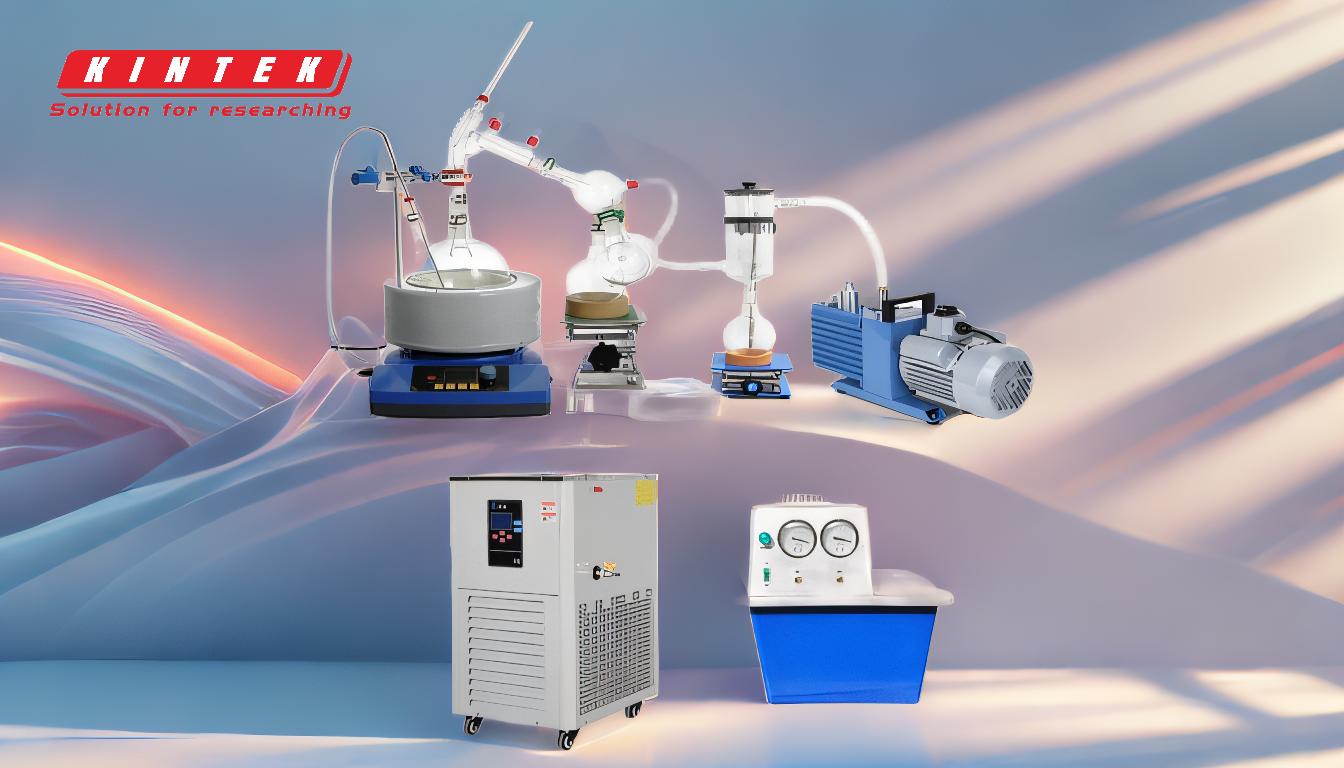Short-path distillation is a specialized purification technique widely used in the pharmaceutical industry for processing heat-sensitive and high-boiling-point compounds. It operates under low pressure, reducing the boiling points of materials and minimizing thermal degradation. This method is particularly effective for separating and refining substances like amino acid esters, polymer intermediates, vitamin E, and CBD. The process involves heating the material in a vacuum, allowing vapors to condense and separate based on their molecular weights. Short-path distillation is favored for its efficiency, precision, and ability to handle delicate compounds, making it essential for producing high-purity pharmaceutical and cosmetic ingredients.
Key Points Explained:

-
Definition and Purpose of Short-Path Distillation:
- Short-path distillation is a vacuum distillation technique designed to purify and separate heat-sensitive or high-boiling-point materials.
- It is particularly valuable in the pharmaceutical industry for producing high-purity compounds such as amino acid esters, polymer intermediates, vitamin E, and CBD.
- The process minimizes thermal degradation by operating under low pressure, which lowers the boiling points of the materials.
-
How Short-Path Distillation Works:
- The process begins by placing the material in a feed vessel, which is then transferred to a heated flask.
- A vacuum is applied to reduce atmospheric pressure, lowering the boiling point of the material and enabling faster and more efficient distillation.
- As the material is heated, it evaporates, and the vapors are drawn into fractionating tubing, where they cool, condense, and re-vaporize.
- The condensed vapors are collected in separate flasks based on their molecular weights, allowing for precise separation and refinement.
- The process can be repeated multiple times to achieve optimal purity.
-
Advantages of Short-Path Distillation:
- Low-Temperature Operation: The vacuum environment reduces the need for high temperatures, preserving the integrity of heat-sensitive compounds.
- High Precision: The ability to separate materials based on their molecular weights ensures high-purity end products.
- Efficiency: The process is faster and more efficient than traditional distillation methods, especially for high-boiling-point substances.
- Minimal Loss: The close proximity of the condensing tube to the heated flask minimizes distillate loss.
-
Applications in the Pharmaceutical Industry:
- Vitamin E Production: Short-path distillation is widely used to produce vitamin E, a key ingredient in skincare products due to its antioxidant properties.
- CBD Purification: The technique is crucial for purifying CBD, as it prevents degradation caused by high temperatures.
- Amino Acid Esters and Polymer Intermediates: These compounds are essential in drug formulation and polymer synthesis, and short-path distillation ensures their high purity.
- Other Heat-Sensitive Compounds: The method is also used for refining other delicate pharmaceutical ingredients that require precise separation.
-
Significance in Handling High-Boiling Materials:
- Short-path distillation can operate at extremely low pressures (as low as 0.001 mbar) and short heating times (less than 1 minute), making it ideal for distilling high-boiling-point substances.
- This capability is particularly important for heat-sensitive materials that would otherwise degrade under traditional distillation conditions.
-
Comparison with Other Distillation Methods:
- Unlike solvent-based separation methods, short-path distillation relies on the melting points of the materials, eliminating the need for additional solvents.
- It offers superior precision and efficiency compared to traditional distillation, especially for complex mixtures and delicate compounds.
-
Broader Industrial Applications:
- Beyond pharmaceuticals, short-path distillation is used in petrochemical and chemical plants to separate hydrocarbons from fossil fuels.
- These hydrocarbons serve as feedstock for producing valuable chemicals, highlighting the versatility of the technique.
In summary, short-path distillation is a critical technology in the pharmaceutical industry, enabling the production of high-purity, heat-sensitive compounds with minimal degradation. Its efficiency, precision, and ability to handle delicate materials make it indispensable for applications ranging from vitamin E production to CBD purification and beyond.
Summary Table:
| Key Aspect | Details |
|---|---|
| Definition | Vacuum distillation for heat-sensitive or high-boiling-point materials. |
| Key Applications | Vitamin E, CBD, amino acid esters, polymer intermediates, and more. |
| Advantages | Low-temperature operation, high precision, efficiency, minimal loss. |
| Industrial Use | Pharmaceuticals, petrochemicals, and chemical plants. |
| Key Benefit | Preserves integrity of heat-sensitive compounds with minimal degradation. |
Ready to enhance your pharmaceutical or cosmetic production? Contact us today to learn more about short-path distillation solutions!










